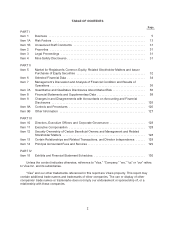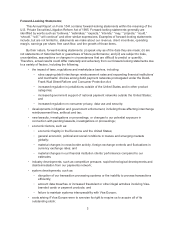Visa 2013 Annual Report Download - page 20
Download and view the complete annual report
Please find page 20 of the 2013 Visa annual report below. You can navigate through the pages in the report by either clicking on the pages listed below, or by using the keyword search tool below to find specific information within the annual report.No-surcharge rules. We have historically implemented rules that prohibit merchants from charging
higher prices to consumers who pay using their Visa-branded card or payment product instead of other
means. As part of the settlement reached in the interchange multidistrict litigation, however, Visa has
agreed to modifications of our rules to permit surcharging on credit transactions under certain
circumstances. See Item 8—Financial Statements and Supplementary Data—Note 20—Legal Matters
included elsewhere in this report. Eleven U.S. states as well as certain jurisdictions outside the
United States have taken steps to limit these no-surcharge rules. In October 2013, a federal court
granted declaratory relief and issued an order permanently enjoining the enforcement of New York’s no-
surcharge law, N.Y. Gen. Bus. Law section 518, based on the entry of a stipulated final judgment in a
case brought by five retailers challenging the constitutionality of that law.
Data protection and information security. In accordance with governing law, we devote substantial
resources to maintain and continually refine our information security program in order to safeguard
account holder information and provide account holder notification in the event of a security breach. In
addition, the U.S. Federal Financial Institutions Examination Council periodically reviews certain of our
operations in the United States to examine our compliance with data integrity, security and operational
requirements and standards, as well as other requirements applicable to us because of our role as a
service provider to financial institutions.
Anti-money laundering, anti-terrorism and sanctioned countries. We are subject to increasingly
expanding legal and regulatory requirements intended to help detect and prevent money laundering,
terrorist financing, fraud and other illicit activity. We devote substantial internal and external resources
and have implemented programs that are designed to prevent the use of our payments network in
facilitating such illegal activity. In addition, some of our products and services may be subject to
regulations promulgated and administered by the U.S. Department of the Treasury, Office of Foreign
Assets Control (“OFAC”). These programs prohibit or restrict dealings with certain countries, their
governments and, in certain circumstances, their nationals, as well as with specifically-designated
individuals and entities such as narcotics traffickers, terrorists and terrorist organizations. We have
developed and implemented policies, procedures, systems and internal controls that are designed to
comply with OFAC requirements and comparable sanctions programs.
Government-imposed market participation influences and restrictions. Our market reach remains
limited by certain governments’ influence on their domestic payments competition and/or their
protection of domestic issuers or payment network processors. Regulators in an increasing number of
countries around the world have received statutory authority to regulate certain aspects of the
payments systems in these countries.
Regulation of Internet transactions. Many jurisdictions have adopted or are considering regulations
that require payments system participants, including our financial institution clients and us, to monitor,
identify, filter, restrict or take other specific actions with regard to certain types of Internet payment
transactions. For example, U.S. federal legislation has been enacted that requires payment system
operators to implement a system that allows issuers to identify Internet gambling transactions so they
have the option to decline such transaction requests. State governments have been interested in the
potential blocking of Internet interstate sales of cigarettes and alcohol, or the collection of state and
local sales taxes on such Internet purchases. Implementing such systems increases costs for our
financial institution clients and us, and may reduce merchant acceptance of Visa-branded cards and
payment products for these purchases.
The U.S. Congress continues to consider regulatory initiatives in the areas of Internet prescription
drug purchases, copyright and trademark infringement and privacy, among others, that could impose
additional compliance burdens on our financial institution clients and us. Some U.S. states are
considering a variety of similar legislation. Various regulatory agencies also continue to examine a
12
























